Milk prices make for good headlines. So when one of the grocery mults slashes its price to just £1 for four pints it makes the news. And although surveys say shoppers want cheap milk, many convenience retailers are leaving the grocery mults to skirmish over milk prices and are instead just getting on and selling it.
Lee McCrumlish from Londis in Ticehurst, East Sussex, says milk is close to the top of the list in terms of what people would expect to see in his store so he tries to make sure he never runs out. And he tries to be competitive: “Sometimes we do deals such as milk and bread for £2. We try to keep the prices stable, but sometimes we have to adjust prices when they fluctuate. When that happens, we put notices out for the customers, but generally fluctuations don’t affect sales.”
Further North, Scott Graham from McLeish in Inverurie, Aberdeenshire, says that his shoppers aren’t particularly price sensitive. “We’re in a high street so a lot of local businesses get their milk from us. We have a Farm Foods and a Tesco in the town, but we still sell one pint of milk for 59p and a 2ltr jug for £1.59. We have tried ‘2 for £3’ and even ‘2 for £2.50’, but the uplift in trade was so slight, it wasn’t worth it. People were saying that they did not need 4ltr of milk. I think the people who want that much milk pick it up as part of their weekly shop.”
Healthy message spreads to more products
Taste and health continue to be the driving force behind purchasing decisions in the butter, spreads and margarines category as a demanding consumer base seeks out natural products that don’t disappoint on taste. That’s the opinion of Stuart Ibberson, business unit director at Arla Foods.
According to Ibberson: “Last year, ‘healthy spreads’ came under fire from the national press, who questioned the health credentials behind these type of products. In turn, this has boosted the profile of natural, good quality butters and spreads.” This has been good news for Arla, with its portfolio of ‘good quality butters and spreads’ including Lurpak and Anchor.
However, over at Dairy Crest the food technicians have been busy adding to the Clover range with a new functional line that’s rather aptly called Clover Additions. Responding to the public taste for healthier products, Clover Additions is a range of Clover spreads with essential vitamins and minerals to ‘help keep the family healthy every day’. Different spreads are aimed at various needs, for example, Clover Strong Bones is rich in vitamin D, while Daily Boost contains seven essential vitamins, and Immunity Support is rich in vitamin A. Sophie Lyons, group brand manager for spreads at Dairy Crest, says Clover Additions offer consumers a ‘quick top-up of daily goodness’.
Ben Simons, from Londis Lechlade in Gloucestershire, gets his milk from Londis, but sells it for below rrp. “Their rrp is £1.63, but we’re selling it for £1.49. I understand that they want us to make the best possible margin, but on milk I prefer to be more competitive - even if it means making less of a margin. Most of the time we run with the Londis rrps, but sometimes we have to tweak them.”
Nick Davey, manager of Budgens Hassocks in West Sussex, says their milk used to match Tesco’s prices, but not any more. He still believes Budgens prices its milk competitively, but range and availability are also important. “We stock all the mainstream types: full cream, skimmed, semi-skimmed, organic, One milk, Cravendale and probably a few others. We aim to always have milk in stock.”
Scott says his point of difference in Inverurie is that he sells Wiseman’s milk, whereas most of the other retailers there get theirs from a local dairy.
Barry Cuthbertson, sales and marketing development manager at Müller Wiseman, believes independents should be capitalising on convenience when it comes to selling milk. “The convenience shopper’s mission is about top-up shopping and invariably that includes milk. About three-quarters of convenience shoppers are interested primarily in availability. They’ll come to you because you’re open at 10pm at night and because your staff are friendly.”
He points to research that shows only one out of five people buy their milk from a convenience store and he’s keen to get that figure up to two in five. “I believe that if you want to be the best in category and compete against others then you’ve got to learn to sell milk. Yes, you will already have milk for sale, but are you actively ‘selling it’?
“To sell it, it needs to be seen from the door, with the best-selling lines at eye level. You don’t have to put your whole milk range there - just some so it’s seen and it gets people off autopilot.”
Some people might say that soft drinks should be visible from the door rather than milk, but Cuthbertson points out that milk is the most sold liquid in a store. “You need to target milk shoppers who aren’t buying it from you. You need to raise its profile so they see it more easily and then think about buying it,” he asserts.
He adds that effective use of POS material is important to get shoppers off autopilot and let them know you may have a regional label or a milk guarantee scheme.
Milk is promoted in Scott’s store as part of Scotland’s Healthy Living campaign and he uses POS supplied by Robert Wiseman as well as some of his own. The shelves in the chiller for the Wiseman’s milk, for instance, are black so they stand out against the white of the fridge, and there’s an illuminated Wiseman’s sign above the chiller.
Cuthbertson is also passionate about range and making sure it’s relevant to your customers. He says there are four core products: blue - whole milk; green - semi-skimmed; purple - 1% (in the grocery mults this is orange); and red - skimmed. But he adds: “You need to know what your local competitors are selling. If organic milk is sold nearby, there’s obviously a market for it so you need to sell it, too. And if you add new lines to your range make sure you do a tap dance about it - tell people; use shelf barkers to highlight that this line is new.”
Scott’s best-sellers are the 1ltr and the 2ltr semi-skimmed - the latter of which has Wiseman’s Grampion label. But last year, on Wiseman’s advice, he added organic milk to his range: “It’s doing really well,” he says. “It’s not a huge seller, but it has brought new customers into the store who didn’t shop with us before. And, of course, once they’re in the store they buy more than milk. We sell about 20 cartons a week.”
If you’re near a school Cuthbertson suggests stocking milk-to-go snack packs and dual siting them with the rest of the milk and with sandwiches and snacks.
Non-dairy alternatives
Alpro is the market leader in the fast-growing plant-based non-dairy food and drink category, which now attracts more than 4.7 million households each year (Nielsen data).
“Retail sales of plant-based products are growing by 14% and are now worth more than £148m,” explains Vicky Walsh, senior brand manager for Alpro UK, who adds that Alpro has a 63.7% share of the UK market.
As well as offering soya products, Alpro’s range now also includes nut-based, rice-based and oat-based alternatives to milk that Walsh says are popular with consumers who are looking for healthy, non-dairy options.
Alpro Almond is currently the star performer among them with sales tripling in the past year, while the latest addition is Coconut Original, which has only 40 calories per glass and no added sugars.
Flavoured milk sells well in Scott’s store - and not just to kids - Scott says workmen tend to buy it in the morning.
Scott believes that looking after the milk category is vital. “We have a lady who looks after the milk. Every morning she takes the deliveries from Wiseman’s (between 1.5 and two cages) and before she finishes at two she’ll check to see whether the order needs to be amended.”
Shelf life is not an issue at his store; he says typically the milk has nine days on it when he gets it. And there’s never any wastage because any milk that needs to be used up is used in the coffee machine.
Cream is a big seller for Scott in the summer thanks to a promotion he runs on local strawberries and raspberries from Barra Berries.
Wiseman’s supplies him with a 1.5m high fridge that stands at the counter in the summer months. From this chiller Scott sells berries and cream on a deal. “The stawberries on their own sell for £2.50 and the cream for £1.10, but we do both for £3.25. We first did this last year and cream sales rose by 300%.”
Nick Davey at Budgens says he sells a fair amount of cream, especially in the summer with strawberries, and at Christmas. “We have single, double, extra thick, clotted, organic, long life - so a fair amount. But single and double are the best sellers. At Christmas we usually have brandy cream, too.”
And Lee McCrumlish says: “We do sell a lot of cream. We tend to stick to the core range of fresh single and double, and long-life single and double, and sour cream. Bank holidays and good weather tend to see an increase in sales of cream, as well as Christmas, but generally sales are steady. Again it’s important to make sure you always have enough in stock.”
In brief
Moshi Monsters in yogurt format
New from Yoplait are Moshi Monsters yogurt pots and Wildlife chocolate desserts. Both are four-packs which are pricemarked at £1. The Moshi Monsters strawberry yogurts have 12 collectable lids - each featuring a different Moshi character.
Longer-lasting milk from Wiseman’s
Müller Wiseman’s Puriti filtered milk now comes under the company’s Black & White range. It is available in whole, semi-skimmed and skimmed varieties with an on-pack message that reads: ‘So pure it stays fresh longer’.
Flavoured milk with a coffee hit
The latest additions to the Frijj range are two coffee milkshakes - latte and mocha - which both come in 220ml bottles and feature the new Frijj logo.
Cadbury unveils limited-edition pot
Strawberry Dream Roses is the latest limited edition in the Cadbury Pots of Joy range. The last limited line - Crème Egg - sold 4.9 million pots with value sales reaching nearly £2m.
Clover revamped with lighter recipe
Clover Lighter than Light is the brand’s lightest recipe to date, claiming to contain 80% less saturated fat than butter. Brand owner Dairy Crest believes the line will attract more health-focused shoppers to Clover, which is currently worth nearly £94m (IRI data).
Going for Gold
Unilever is spending big bucks on a campaign to support new Gold from Flora and Bertolli with Butter. Gold from Flora is a blend of butter and Flora that claims to be 40% lower in saturated fat than block butter, while Bertolli with Butter boasts 45% less saturated fat.




















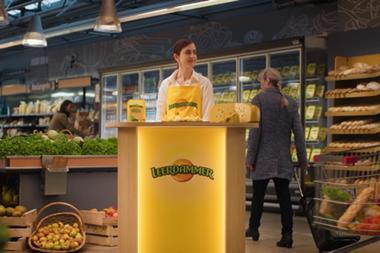
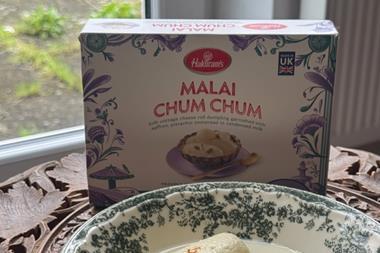
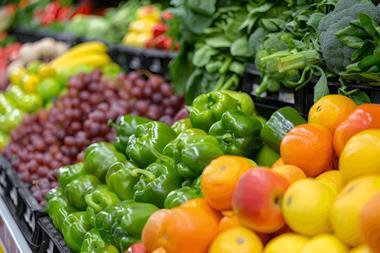

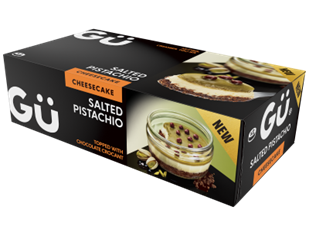
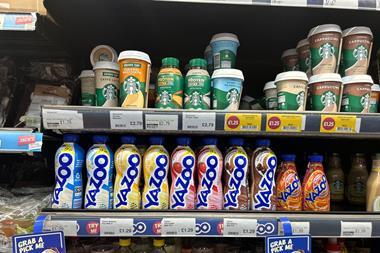
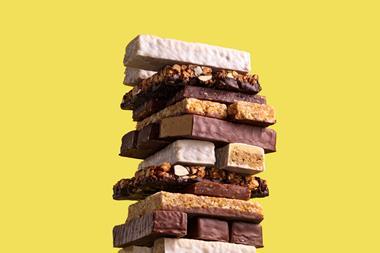





No comments yet